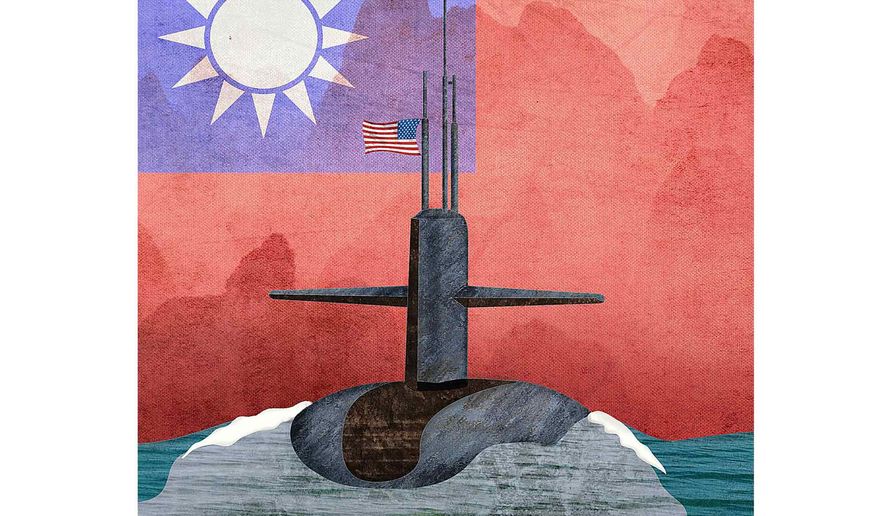OPINION:
The fight against the Islamic State, Russia’s annexation of Crimea and other arguably less-pressing issues — including the change in U.S. policy toward the Cuban regime — have thwarted President Obama’s much-vaunted second-term plan for a “pivot” to Asia. That move should begin again quickly, but with three provisos.
First, the president should effect the shift in ways that remain ever-mindful of the ongoing importance of Europe and our nation’s interests beyond Asia. Second, this must not be a “pivot to Beijing” that goes beyond the administration’s already considerable forbearance of the Chinese government’s oppression of the country’s own people and destabilizing actions in the region. Third, it must accommodate the security needs of Taiwan, our nation’s friend and ally.
Taiwan’s greatest need is new submarines. It currently has four diesel electric vessels, and these are, by military and technological standards, ancient. Two are World War II-era units from the United States. The other two are mid-1980s Dutch-built units. The contract with the Netherlands included an option of purchase of two more, but the Dutch, under pressure from Beijing, turned down Taiwan’s request in 1992.
Today, among Western nations, only the United States is willing to support Taiwan — which counts me among those assisting with its agenda in Washington — with major defensive weapons. Other countries view Taiwan as an ally but are afraid to risk offending major-power Beijing. The United States has not only military capabilities, but also legal responsibilities that make it uniquely situated to assist Taiwan. Under the 1979 Taiwan Relations Act, legislation that I remain proud to have played a part in passing, our country is required to “provide Taiwan with arms of a defensive character.” Unfortunately, in spite of our own military prowess, we, too, can be intimidated, and, as with many laws, the essence lies in the Taiwan Relations Act’s interpretation: Which arms should the United States provide, and in what quantity?
In 2001, President George W. Bush committed to help Taiwan acquire or produce eight more subs, but, since then, our government, apparently succumbing to intimidation, has taken no further action. Nor has it agreed to enable Taiwan to buy new F-16 fighters — another glaring deficiency in the nation’s arsenal. No major arms sale of any sort has been approved since 2011.
Clearly, Taiwan is extremely vulnerable. China, a country of 1.3 billion people with a territory of 3.7 million square miles, has deployed 1,200 missiles that could quickly and easily devastate Taiwan, an island nation of 23 million people with a territory of approximately 14,000 square miles.
Adding to this already-grim imbalance, Beijing’s military might is expanding at an alarming rate. Military spending has doubled since 2008 and has grown by double digits every year since 1989. According to a report last month by the congressionally mandated U.S.-China Economic and Security Review Commission, by 2020 Beijing intends to add to its forces its first carrier-based aviation wing; a second aircraft carrier; 600 new combat aircraft, including its first fifth-generation fighter jets; and 60 new surface ships and submarines.
Beijing’s submarine fleet already includes eight state-of-the-art vessels that the regime bought from Russia in the five years after the United States’ equal commitment that remains unfulfilled. By 2020, China is projected to have 82 submarines patrolling in the Asia-Pacific region. We are slated to remain stuck on 32.
The result of China’s across-the-board buildup, according to the commission, is that its “military modernization has significantly increased [its] ability to conduct military operations against Taiwan and to deter, delay, and deny any U.S. intervention in a cross-strait conflict.” Also according to the report, “China now is able to threaten U.S. bases and operating areas throughout the Asia Pacific, including those that it previously could not reach with conventional weapons, such as U.S. forces on Guam.”
Perhaps the new Congress will be more cognizant of the potential peril to Taiwan and the United States. Taiwan has many supporters in Congress on both sides of the aisle. The number likely to play a more active role in promoting our bilateral security relationship increases with the influx of Republican members in both houses and the GOP’s takeover of control of the Senate.
I urge the august body that I once led to take early action to increase pressure on the administration to allow Taiwan to acquire the technical support and weapons systems necessary to produce its own submarines. I hope that the Obama administration will move swiftly to heed congressional advice and simultaneously diminish the Chinese threat to Taiwan and regional security, lessen the United States’ naval burden, and increase the responsibility of democratic nations seeking to maintain stability in their own China seas.
• Bob Dole is a former Senate majority leader and 1996 Republican candidate for president.




Please read our comment policy before commenting.